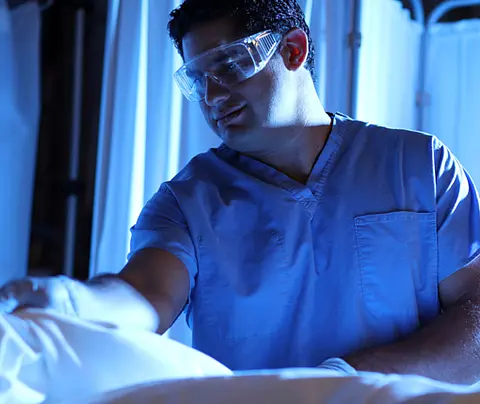RTI International researchers assessed data collected in 2004 survey that was not reported out
RESEARCH TRIANGLE PARK, N.C. — A new paper by RTI International, a nonprofit research institute, describes the earliest collection of data on the state of toxicology laboratories in the United States and underscores the need for more information as medical examiners and coroners face growing caseloads from the opioid crisis.
The paper outlines a data assessment undertaken by RTI researchers who examined survey data collected in 2004 using publicly available data from the Bureau of Justice Statistics’ Census of Medical Examiner and Coroner (CMEC) offices. RTI researchers specifically revisited data collected about toxicology laboratories that were not included in the final report.
“These data, despite not being all that recent, shows that toxicology testing was already contributing significantly to the workload of medical examiner and coroner offices in 2004,” said Jeri Ropero-Miller, chief scientist for the Division for Applied Justice Research at RTI. “Given the acceleration of the opioid crisis since then, this means that medical examiners and coroners are facing a crippling number of overdose cases that are substantially taxing their resources.”
Of the respondents to the 2004 survey, 83.7% of medical examiners and coroners performed toxicology testing externally, according to the paper. The average turnaround time for cases requiring toxicology services was less than two months.
Toxicology analyses were the most-requested procedure at medical examiner and coroner offices that offered toxicology services, according to the paper, with an average of 184.8 accepted cases per year. The next most requested service was a review of medical records at an average of 169.7 accepted cases per year.
The average and median annual operating budget for medical examiner and coroner offices offering internal or external toxicology testing performed was estimated at $553,000 and $49,000, respectively. Less than 10% of medical examiner and coroner offices reported federal data collection efforts, and only 35% reported using a computerized information system.
“This will be valuable as a baseline for our understanding of the state of toxicology labs,” said Hope Smiley-McDonald, director of the Investigative Sciences Program at RTI. “Our hope is that this analysis will be useful and provide insight into new data that we have been collecting for the Bureau of Justice Statistics for the 2018 CMEC administration, which is currently in the field.”
RTI is the Bureau of Justice Statistics’ data collection agent for the 2018 CMEC. As of Feb. 6, only two-thirds of medical examiner or coroner offices nationwide had responded to this important survey.
For more information about the 2018 CMEC and to see which offices have responded to the survey, visit the CMEC website.

- A new paper by RTI International describes the earliest collection of data on the state of toxicology laboratories in the United States.
- The paper outlines an assessment of survey data collected in 2004 using publicly available data from the Bureau of Justice Statistics.
- Toxicology analyses were the most-requested procedure at medical examiner and coroner offices that offered toxicology services.
RTI International Media Relations:

